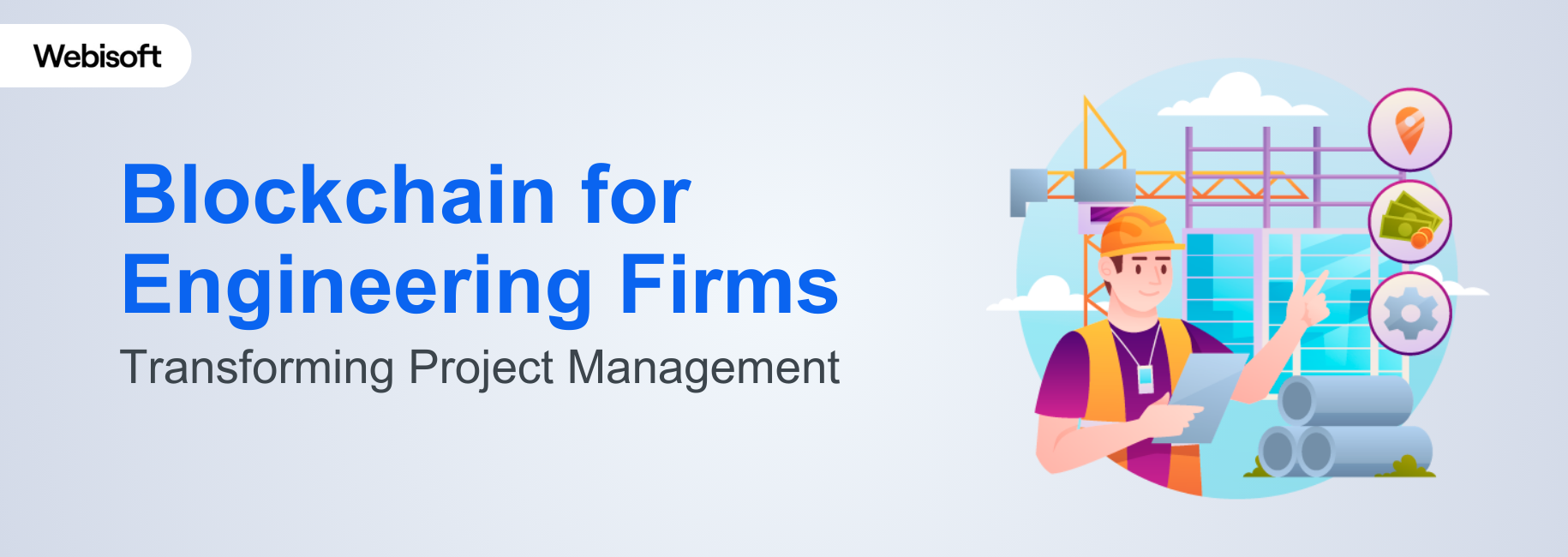Have you ever thought about how blockchain technology could revolutionize the way engineering firms operate? At the heart of it, blockchain for engineering firms means integrating a secure, digital ledger system into their operations. But what’s the core benefits here?
The benefits are clear, more efficient project tracking, rock-solid data security, and seamless collaboration across the board.
Want to know more about it and why choose blockchain for your engineering firm? Read this article and explore everything about it including your go-to partner Webisoft.
Contents
- 1 What is the Blockchain for Engineering Firms?
- 2 How Blockchain Enhances Engineering Firm’s Security?
- 3 How Blockchain Can Benefit in Engineering Firms?
- 4 Blockchain for Engineering Firms: Applications in Engineering Projects
- 5 The Challenges in Utilizing Blockchain for Engineering Firms
- 6 Why Should You Choose Webisoft to Implement Blockchain for Engineering Firms?
- 7 Final Note
- 8 Frequently Asked Questions
What is the Blockchain for Engineering Firms?
Blockchain technology for engineering firms is a digital ledger technology. It records transactions across many computers. These records are secure and unchangeable. Engineering firms use blockchain to manage projects and data efficiently.
The technology ensures secure sharing and storing of project information. It reduces errors and enhances transparency in operations. Blockchain simplifies complex processes in engineering. It does so by providing a reliable and tamper-proof system.
This technology is vital for project management and data integrity. It helps engineering firms to innovate and stay ahead in a competitive market.
How Blockchain Enhances Engineering Firm’s Security?
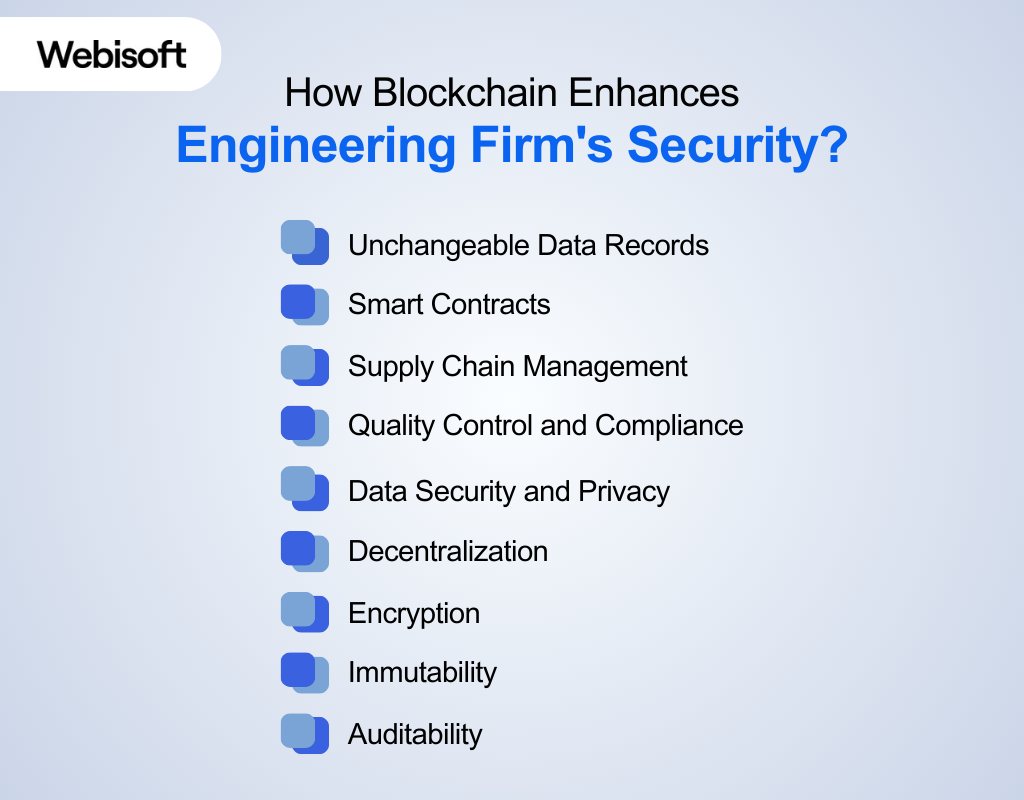
Blockchain technology is revolutionizing security in engineering firms. With its unique features, it’s changing how firms handle data, contracts, and supply chains.
In this article, we’ll explore the various ways blockchain enhances security in engineering.
Unchangeable Data Records
Blockchain for engineering security ensures that it can’t be altered once data is recorded. This feature is vital for engineering firms.
It provides a reliable record of project details, designs, and specifications. You can trust the integrity of data, knowing it remains unchanged over time.
Smart Contracts
Smart contracts automate and enforce agreements in engineering projects. These blockchain-based contracts execute tasks only when set conditions are met.
This lessens the risk of disputes and delays in projects. Smart contracts bring efficiency and trustworthiness to project management.
Supply Chain Management
Blockchain provides transparency in supply chain management. You can track materials from source to delivery.
This visibility ensures the authenticity and quality of materials used in engineering projects. It’s a tool that significantly reduces fraud and errors in the supply chain.
Quality Control and Compliance
Quality control and compliance are critical in engineering. Blockchain helps maintain high standards. It records quality checks and compliance data securely.
This information is easily auditable, ensuring projects meet industry regulations and standards.
Data Security and Privacy
Blockchain technology in engineering offers enhanced data security and privacy. Its encryption methods protect sensitive project information.
Engineering firms benefit from this secure environment. Confidential designs and client data remain protected from unauthorized access.
Decentralization
The decentralized nature of blockchain means no single point of failure. This aspect is crucial for engineering firms handling large-scale projects.
Decentralization reduces the risk of data loss and tampering. It ensures continuous access to project data.
Encryption
Blockchain’s encryption secures all transactions and data exchanges. In engineering, this means secure sharing of project details and designs. It provides stability when handling sensitive information across various parties.
Immutability
Once recorded, blockchain data cannot be changed or deleted. This immutability is essential for maintaining accurate project histories. Engineering firms can rely on this feature to maintain transparent and tamper-proof records.
Auditability
Blockchain’s ledger allows for easy auditability. You can trace every transaction and data entry. This feature is beneficial for engineering firms during project reviews and audits. It ensures accountability and transparency in all project phases.
How Blockchain Can Benefit in Engineering Firms?
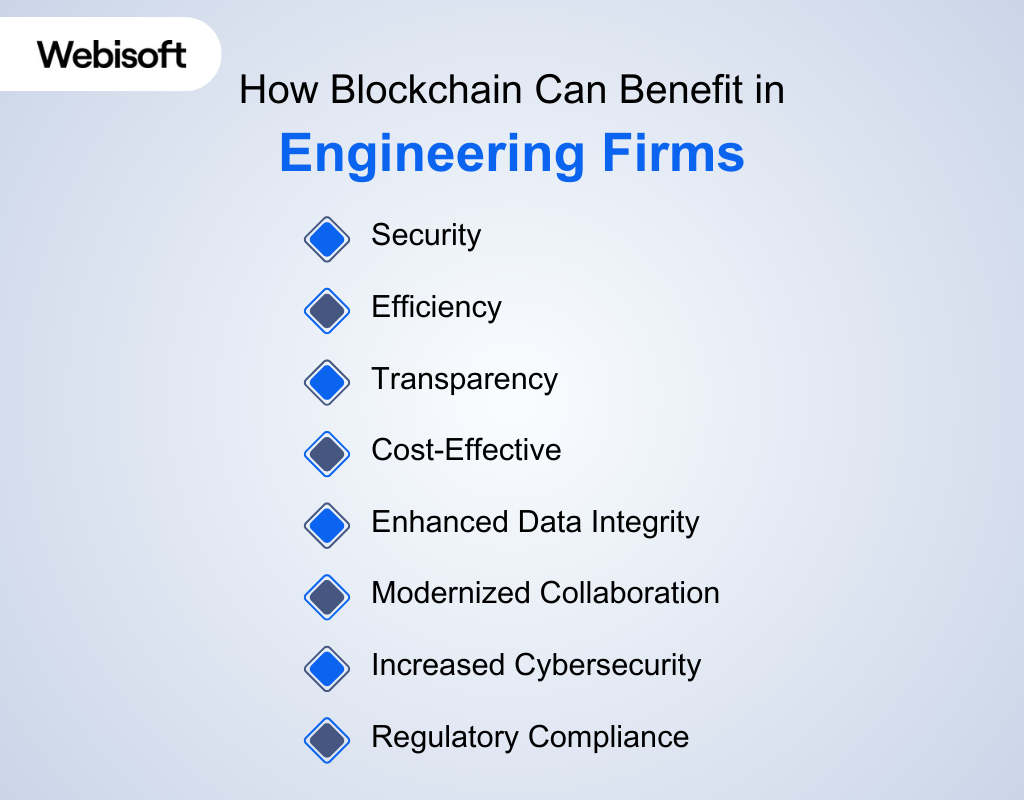
Blockchain technology is revolutionizing various sectors, including engineering. This powerful tool offers numerous benefits for engineering firms, from enhanced security to improved efficiency. Let’s explore how blockchain can benefit engineering practices.
Security
Blockchain offers unparalleled security for engineering projects. It creates tamper-proof records of all transactions and data exchanges. This means sensitive project data is safeguarded against unauthorized access or alterations.
Efficiency
Efficiency in project management is crucial. Blockchain streamlines processes by automating data verification and record-keeping.
This lessens the time spent on administrative tasks. Moreover, it allows more focus on core engineering work. As a result, projects progress faster and with fewer errors.
Transparency
Transparency is vital in engineering projects. Blockchain technology ensures all actions are traceable and accountable.
This visibility builds trust among stakeholders, as everyone involved can track progress and verify data. Transparency leads to smoother project execution and fewer misunderstandings.
Cost-Effective
Blockchain can be a cost-saving tool for engineering firms. However, blockchain cuts operational costs by reducing the need for intermediaries and streamlining processes.
These savings can be significant, especially in large, complex projects where efficiency is important.
Enhanced Data Integrity
Data integrity is non-negotiable in engineering. Blockchain ensures that data cannot be altered without consensus once data is recorded.
This feature maintains the accuracy and consistency of project data, which is essential for quality control and compliance.
Modernized Collaboration
Collaboration in engineering projects often involves multiple parties. Blockchain facilitates this by providing a shared, immutable platform for data exchange.
This modernized approach to collaboration enhances coordination and reduces the chances of conflicts or data discrepancies.
Increased Cybersecurity
In today’s digital age, cybersecurity is a top concern. Blockchain’s decentralized nature makes it less vulnerable to cyber attacks.
For engineering firms, this means enhanced protection against data breaches, preserving the confidentiality and integrity of sensitive project information.
Regulatory Compliance
Engineering projects must comply with various regulations. Blockchain aids in regulatory compliance by providing an auditable trail of all project activities.
This makes it easier to demonstrate compliance with industry standards and legal requirements, simplifying the regulatory aspect of project management.
Blockchain for Engineering Firms: Applications in Engineering Projects
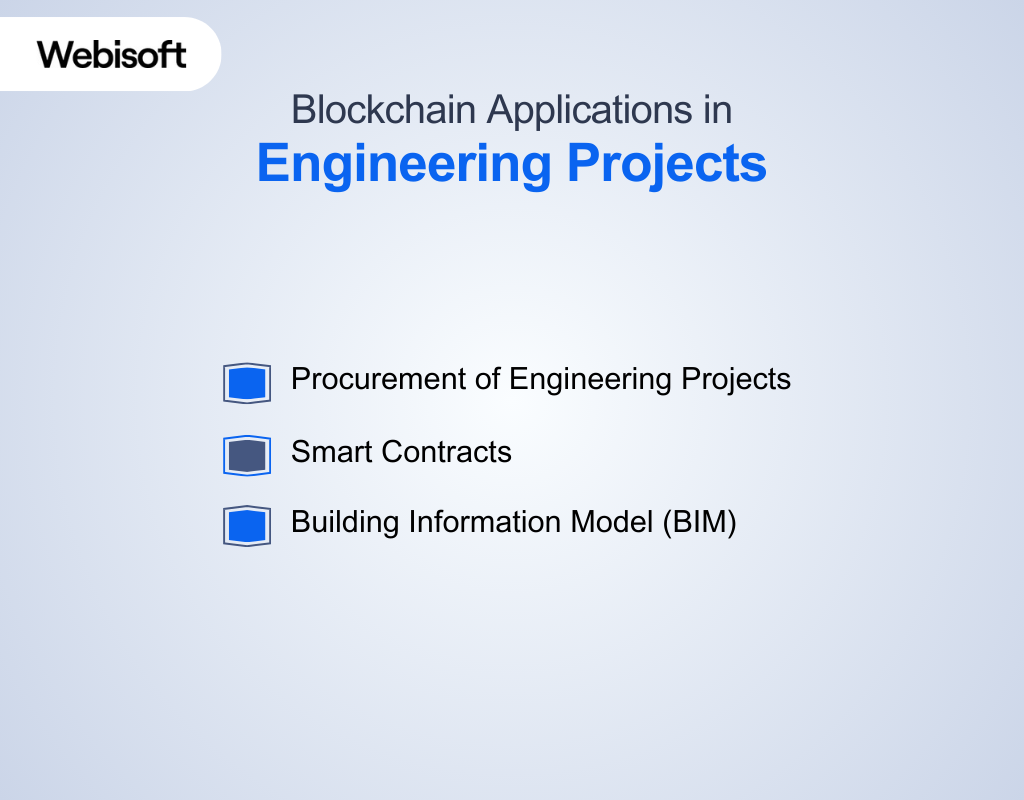
Blockchain technology is revolutionizing engineering projects. This innovative technology offers transparency, security, and efficiency.
In this article, we’ll explore how blockchain is applied in various aspects of engineering projects. The applications of blockchain in engineering projects are:
Procurement of Engineering Projects
Blockchain transforms procurement in engineering projects. It ensures transparency and security in the procurement process.
With blockchain, every transaction and material purchase is recorded. This makes it easy to track expenditures and materials. For you, this means greater accountability and less risk of fraud in project procurement.
Smart Contracts
Smart contracts in blockchain are changing how agreements are handled in engineering. These contracts automatically execute and enforce terms when conditions are met.
This reduces the need for intermediaries, saving time and money. For engineering projects, smart contracts mean smoother, more efficient operations.
Building Information Model (BIM)
Blockchain is integrated with building information modeling (BIM) to enhance project management. It ensures secure, real-time sharing of BIM data.
All stakeholders can access updated project information. This integration improves collaboration, reduces errors, and enhances the quality of construction projects.
The Challenges in Utilizing Blockchain for Engineering Firms
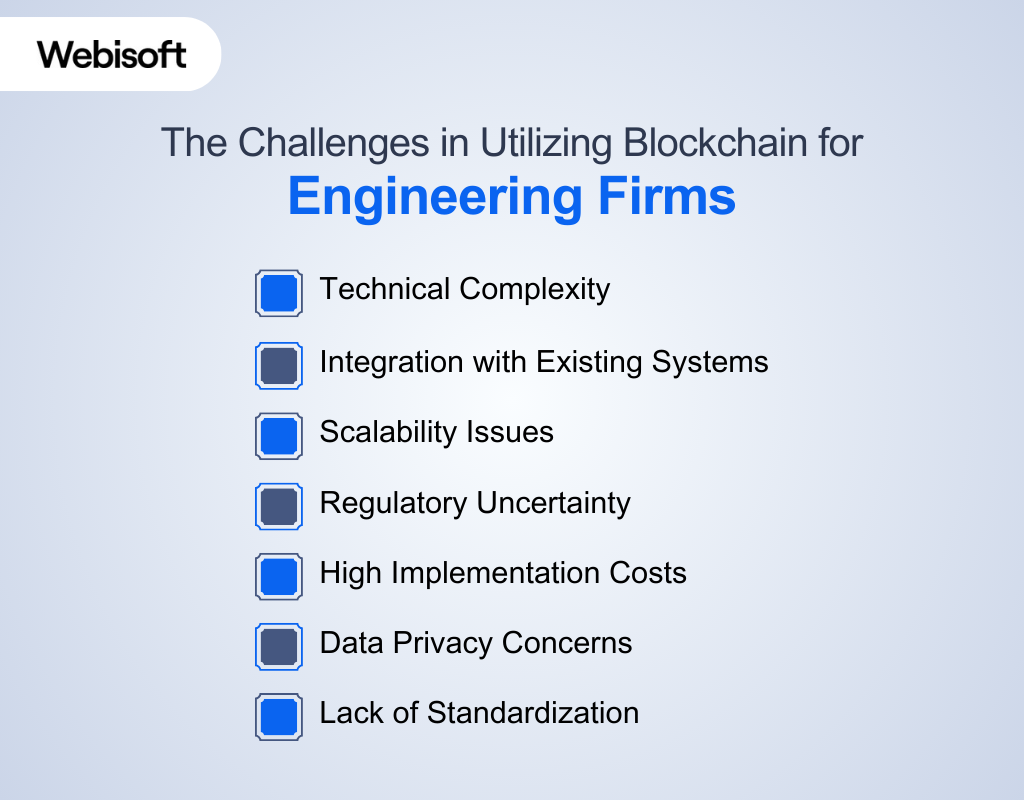
While blockchain technology offers significant benefits to engineering firms, it’s not without challenges. Integrating this innovative technology into traditional engineering processes can be complex.
Let’s explore firms’ limitations in adopting blockchain technology in their operations.
| Challenge | Description |
| Technical Complexity | Implementation requires specialized knowledge, creating a skill gap. |
| Integration with Existing Systems | Merging with established software and processes demands careful planning. |
| Scalability Issues | Large-scale engineering projects may face challenges in handling vast data on blockchain. |
| Regulatory Uncertainty | Navigating unclear legal frameworks poses risks in compliance and legal implications. |
| High Implementation Costs | Significant expenses for new hardware, software, and training can hinder adoption. |
| Data Privacy Concerns | Sharing sensitive project data raises privacy issues, necessitating compliance with regulations. |
| Lack of Standardization | Absence of industry-wide standards may lead to compatibility issues between blockchain systems. |
Technical Complexity
Blockchain technology can be technically complex. For engineering firms, understanding and implementing this technology requires specialized knowledge.
Many firms need more in-house expertise for blockchain integration. This gap can make the adoption process daunting and slow.
Integration with Existing Systems
Integrating blockchain into existing systems poses significant challenges. Engineering firms often use established software and processes.
Merging these with blockchain technology requires careful planning and execution. It’s not just about adopting a new technology; it’s about transforming existing workflows.
Scalability Issues
Blockchain technology faces scalability issues. As engineering projects are typically large-scale, handling vast amounts of data on blockchain can be challenging.
Overcoming these scalability limitations is crucial for effective blockchain implementation in engineering.
Regulatory Uncertainty
Engineering firms venturing into blockchain must navigate unclear legal frameworks. This uncertainty can pose risks regarding compliance and the legal implications of using blockchain in engineering projects.
High Implementation Costs
Implementing blockchain technology can be expensive. Engineering firms must invest in new hardware, software, and training. For many firms, especially smaller ones, these costs can significantly hinder blockchain adoption.
Data Privacy Concerns
While blockchain offers enhanced security, data privacy remains a concern. Sharing sensitive project data on a blockchain network can raise privacy issues.
Firms must ensure that their blockchain use complies with data privacy regulations and standards.
Lack of Standardization
Blockchain technology needs to be standardized more in the engineering sector. This absence of industry-wide standards can lead to compatibility issues between blockchain systems and platforms.
Why Should You Choose Webisoft to Implement Blockchain for Engineering Firms?

Choosing the right partner for implementing blockchain technology in your engineering firm is crucial. Webisoft stands out as a leading choice for this pivotal role.
Explore why Webisoft is the ideal partner for integrating blockchain technology into your engineering projects.
Expertise in Blockchain Technology
Webisoft has a team of experts specializing in blockchain technology. Our professionals are well-versed in the latest blockchain advancements and how they apply to engineering.
We ensure your projects benefit from the most advanced and suitable blockchain solutions, enhancing security and efficiency.
Customized Blockchain Solutions
We understand that each engineering firm has unique needs. At Webisoft, we focus on delivering customized blockchain solutions.
Our approach is to tailor our services to fit your project requirements, ensuring a seamless integration with your existing systems and workflows.
Proven Track Record
Webisoft prides itself on a proven track record of successful blockchain implementations.
Our experience in various engineering projects gives us a unique understanding of the limitations and opportunities in this sector. We use this experience to provide you with reliable and effective blockchain solutions.
Ongoing Support and Training
Implementing blockchain technology is a journey, not a one-time task. We at Webisoft provide continuous support and training for your team. We aim to ensure you are confident in using the blockchain systems and maximizing their potential in your engineering projects.
Final Note
In conclusion, blockchain technology is a significant step forward for engineering firms. It’s not just a tech upgrade; it’s a complete shift in how project security, data integrity, and efficiency are approached.
Opting for blockchain is more than a choice. Blockchain for engineering firms is a strategic move towards more reliable and transparent engineering practices. In an industry where every detail counts, blockchain could be your edge.
However, are you ready to take your engineering firm to the next level with blockchain? Webisoft is here to help you explore this exciting journey. Connect with Webisoft and transform the future of your engineering projects!
Frequently Asked Questions
Is blockchain technology expensive for engineering firms to implement?
Implementing blockchain can be cost-effective in the long run, as it reduces errors and improves efficiency, though initial setup costs vary.
Can small engineering firms also use blockchain?
Yes, blockchain is scalable and can benefit small engineering firms, offering them the same security and efficiency as larger companies.
How does blockchain improve project management in engineering?
Blockchain modernizes project management by providing real-time, and tamper-proof data tracking. Moreover, it enhances collaboration and decision-making in engineering projects.
Will blockchain technology be widely adopted by engineering firms in the future?
Yes, blockchain technology is likely to be widely adopted by engineering firms in the future. It helps make things clear, safe, and organized.
This can make work smoother, help teams work together better, and keep track of projects easily.
